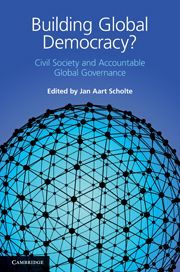Book contents
- Frontmatter
- Contents
- List of figures
- Participants in the Gothenburg Workshop
- List of contributors
- Editor's acknowledgements
- List of abbreviations
- Introduction
- 1 Global governance, accountability and civil society
- 2 Civil society and accountability of the United Nations
- 3 The World Bank and democratic accountability: the role of civil society
- 4 Civil society and IMF accountability
- 5 Civil society and the WTO: contesting accountability
- 6 Civil society and accountability in the Commonwealth
- 7 The Organisation of the Islamic Conference: accountability and civil society
- 8 Civil society and patterns of accountability in the OECD
- 9 Civil society and G8 accountability
- 10 Structuring accountability: civil society and the Asia-Europe Meeting
- 11 Civil society and accountability in the global governance of climate change
- 12 Civil society and accountability promotion in the Global Fund
- 13 Accountability in private global governance: ICANN and civil society
- 14 Civil society and the World Fair Trade Organization: developing responsive accountability
- Conclusion
- Bibliography
- Index
13 - Accountability in private global governance: ICANN and civil society
Published online by Cambridge University Press: 05 June 2012
- Frontmatter
- Contents
- List of figures
- Participants in the Gothenburg Workshop
- List of contributors
- Editor's acknowledgements
- List of abbreviations
- Introduction
- 1 Global governance, accountability and civil society
- 2 Civil society and accountability of the United Nations
- 3 The World Bank and democratic accountability: the role of civil society
- 4 Civil society and IMF accountability
- 5 Civil society and the WTO: contesting accountability
- 6 Civil society and accountability in the Commonwealth
- 7 The Organisation of the Islamic Conference: accountability and civil society
- 8 Civil society and patterns of accountability in the OECD
- 9 Civil society and G8 accountability
- 10 Structuring accountability: civil society and the Asia-Europe Meeting
- 11 Civil society and accountability in the global governance of climate change
- 12 Civil society and accountability promotion in the Global Fund
- 13 Accountability in private global governance: ICANN and civil society
- 14 Civil society and the World Fair Trade Organization: developing responsive accountability
- Conclusion
- Bibliography
- Index
Summary
Introduction
The Internet has experienced phenomenal expansion since its introduction to the public in the 1990s, such that it is now commonplace to observe how global, ubiquitous and basic this medium of communication has become. Yet most users have little idea of how the Internet operates globally. What and who make the Internet work as effectively as it does on a global scale? How centralised or diffuse are the relevant decision-making mechanisms? Who is responsible for what, and how does that impact the other parts of the network and the various stakeholders, irrespective of where they reside? Such questions pertain to what is now widely called ‘Internet governance’.
The creation of the Internet Corporation for Assigned Names and Numbers (ICANN) in 1998 was a key step in the development of Internet governance. To appreciate the critical importance of ICANN, one might consider that this institution has the managerial and technical capability to shut down or severely limit access to, for example, all websites ending with the suffix ‘.org’ or the Internet domain of a whole country. Such actions may be extreme and unlikely in the ordinary course of events, but they are nonetheless within ICANN's reach, and their consequences would be enormous. Less spectacularly, ICANN could by its decisions impair the capabilities of some stakeholders on the Internet while fostering those of others. Given these far-reaching capacities it is very important that effective arrangements are in place to hold ICANN accountable.
- Type
- Chapter
- Information
- Building Global Democracy?Civil Society and Accountable Global Governance, pp. 267 - 288Publisher: Cambridge University PressPrint publication year: 2011
- 5
- Cited by



